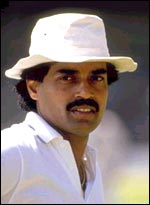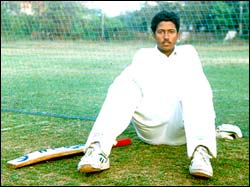The Rediff Interview / Dilip Vengsarkar
'India is playing too much
cricket; that is the problem'
How do you explain a man who, after scoring three Test centuries at Lord's, that Mecca of cricket, breaks down in tears after losing a Ranji Trophy final?
It's all about pride, says Dilip Balwant Vengsarkar.
"I took great pride in winning, whatever the level of cricket. And I was playing for Bombay," Vengsarkar says, simply.
 The former India skipper and Bombay star has always been a team man. Ask him to rate the three Test centuries he scored at Lord's, and he immediately picks the last one -- not for the quality of his stroke-making, but because it helped India register its maiden and, as it turns out, only win at the venue. And also because the innings also won the series for India -- the country's last overseas win, 15 years ago.
The former India skipper and Bombay star has always been a team man. Ask him to rate the three Test centuries he scored at Lord's, and he immediately picks the last one -- not for the quality of his stroke-making, but because it helped India register its maiden and, as it turns out, only win at the venue. And also because the innings also won the series for India -- the country's last overseas win, 15 years ago.
For six years now, Vengsarkar has been running one of the best privately sponsored coaching academies in the country -- the Elf-Vengsarkar Academy, at the picturesque Oval Maidan in Bombay.
Known for his plain speaking -- a trait that has landed himself in trouble with the authorities -- the Colonel, as he is affectionately called, talks to Faisal Shariff about the lacunae in the Indian coaching system and discusses the problems plaguing Indian cricket.
Excerpts:
What, according to you, is wrong with the coaching system in India?
The lack of quality coaches is to my mind the first glitch. It is very important that we have coaching seminars in India. We should invite coaches like Ian Chappell, Rodney Marsh and Frank Tyson to coach the coaches.
What has been happening is that if a boy goes to a cricket academy and then goes to school, he ends up practising under a different coach, who tries to change the techniques he learnt at the academy. It is important to have the right kind of coaches, it is also important to have continuity in coaching.
Coaching in India has to develop a lot. The best thing that could have happened is the setting up of the National Cricket Academy in Bangalore, and the other zonal academies coming up.
You say it is necessary to coach the coaches. Yet you have had no such coaching yourself, and are still rated among the top coaches in the country today, how is that?
It is relatively easy to coach under-14 boys, like I am doing now. When a player is young, a lot of coaching is about fine-tuning his skills and giving him the right kind of exposure and experience. At our academy, we donít coach the boys -- we just fine-tune them. We play lots of matches on good, competitive wickets. Our academy is perhaps the only one where the boys are learning to play on the back foot -- we have fast wickets, there is no point playing on placid Indian wickets with no bounce, learning to play off the front foot and then struggling when they go abroad.
What according to you is the essence of coaching?
I think the most important thing is to try and not change anyoneís natural game. No one is absolutely perfect. Nobody can bat exactly like the coaching manuals; each player has his own variations, improvisations, and imperfections.
Whatever he has, needs to be improved upon, that is the essence of coaching. How he then plays in different conditions and adapts to them makes him the complete cricketer he has set out to become. I set out to give the game something in return for all that it has given me; I want to give the best facilities to the boys in my charge, free of cost.
We pick our boys from the U-14 tournaments organised in May each year by the Mumbai Cricket Association. We pick around 30 boys and groom them; they then go on to the Under-19 stage. In fact, almost all our boys are now playing for their respective state teams in that age group.
It's easy for anyone to pay money and join an academy. The academy will then train him to the best of his potential -- but that defeats the point. Here, we pick promising players, and then train them, so we are training the ones with real potential. My goal is to produce good cricketers for the country.
Would you say in all honesty that there is enough talent in the country?
There is enormous talent in India -- but it is up to us to go out there and tap it. I feel that the Indian cricket board has not given enough importance to the under-16 and under-19 cricket, because of which we donít have cricketers who can play for the country straightaway.
We need to take renewed interest in under-19 cricket, and in the India A team; we need to send these teams to Australia and South Africa for exposure if we want to get high quality cricketers.
Do you think that there should be one single national academy, on the lines of the one now set up in Bangalore, or should we have academies all over the country?
Actually, there are zonal academies already, but I think that there should be an academy in every state. It is true that there is a lot of talent in the maidans, but eventually we need to get these boys into the academies, give them proper coaching.
What is your reading of India's national coach, John Wright?
Itís too early to say anything about him. He has been at the helm for just a year, we need to give him one more year before passing judgement. And, anyway, what can John do? India is playing too much cricket; that is the problem. The players are tired; they need rest, a break to recharge their batteries. There has to be a gap of at least one month between one series and the next; but here the tours are overlapping.
India is in South Africa now and before that tour ends, England are already here. Actually, England were here two weeks ahead of time to get used to the conditions -- I think they will get more acclimatised to India than the Indian team (laughing).
How was it different during your playing days?
We didnít have too many one-day games. We had the time to play first class cricket as wel; that helped us, and it also helped other cricketers also to come up. I donít remember the last time the top Indian cricketers played for their respective states.
That is the crux of the matter. If we have a budding fast bowler, he will get confidence bowling to our top batsmen. But if he plays in the domestic season without all these stars, how will he improve?
Why has the opening pair been the bane of Indian cricket since the exit of Sunil Gavaskar?
The simple reason is that we havenít groomed anyone. I will blame the Indian selectors and the system for that. Each selector thinks of his zone and pushes his own players, and when that happens you donít pick the best eleven.
It is the selection of the fringe players that is very important. Ten-twelve players pick themselves; it is in picking fringe players that the acumen of selectors comes into play. If you are going to indulge in horse-trading while picking these fringe players, then there will be players going on tours as tourists, and that will not help you develop a good team.
 I canít buy the argument that India does not have opening batsmen. There are quite a few good ones around; it's only a matter of them being tapped.
I canít buy the argument that India does not have opening batsmen. There are quite a few good ones around; it's only a matter of them being tapped.
Wasim Jaffer is a very good batsman in form. I havenít seen Connor Williams at all, but if he is good enough to make it to the team, then he should play. Maybe, he might come through as Das did.
Vinayak Mane is a good prospect, but he needs another year to get ready for international cricket; he has to get a lot more runs in domestic tournaments.
In the first Test at Bloemfontein, Sachin Tendulkar produced a superb century. You've seen him since he was a schoolboy, where would you rate this innings?
It is one of the best innings ever. I have seen all his big innings -- when he scored 100 against Australia and then the ton at Old Trafford that saved the match for us. Those were very high-class innings. This one is amongst the best I have seen.
I think that at this point; he is very strong mentally and physically. He is very focussed and takes great pride in playing well for his country.
Virendra Sehwag plays cricket like Tendulkar; does he strike you as an exciting prospect?
He is a good cricketer; there is no doubt about it. He showed great temperament. India was 60/4 when he came out to play his first Test innings, and his partnership with Sachin was top-notch. I think he is very strong, mentally; and that is a very important requirement for Test cricket.
Rahul Dravid has been shuffled up and down the order, like some sort of joker in the pack. Do you think this will affect his batting?
Dravid is a class act, you can't think of dropping him from your team. He is one of the best batsmen in the world. It is a matter of time really; he has just failed in one Test and Iím sure he will prove himself again.
Do you think one reason for our lack of success abroad is the lack of penetrative bowlers?
It is very unfortunate that we donít have bowlers who can bowl the opposition out twice. Harbhajan and Kumble are the only bowlers who have won Test matches for India, but then again those games were played on our wickets. We are still looking for someone to win us matches abroad.
Where do you reckon lies the problem?
I think the pool of players of international class available to us is very small, when it comes to bowling. The reason for this is that the emphasis on under-19 and ĎAí team tours is minimal.
They have been playing the same set of players all these years. And the ODIs take its toll on cricketers. They are a tired lot. You canít expect them to bowl at their best every day.
Injuries are another issue that is affecting the players. Ashish Nehra, Zaheer Khan and Kumble are all recuperating from injuries. I think our international itinerary is taking its toll.
But arenít other countries playing the same amount of cricket?
No, they are not. Australia last played England in July-August, since then they have been playing first class cricket in Australia; they are keen and hungry now, not having played international cricket for three months. That is very important.
Interviews
Mail Cricket Editor